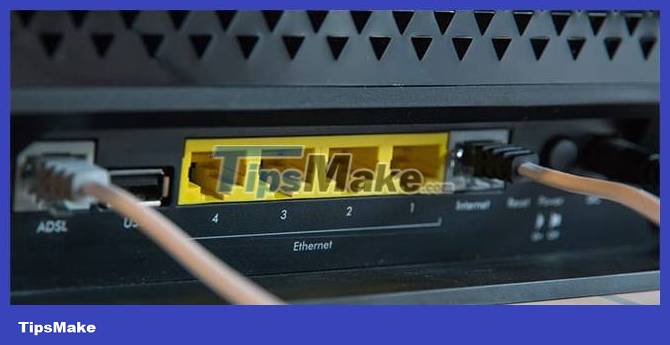Should I use WiFi or Ethernet and why?
Not too long ago, you had to choose between a wired or wireless setup for your home Internet, online gaming, and all other network-based activities. But now there's no debate: WiFi is the obvious choice.
Is it really the end for Ethernet? Or does good old-fashioned cable connectivity still have a place in the modern technological world? Let's find out through the following article!
Key differences between Ethernet and WiFi
The difference between Ethernet and WiFi is simple.
Ethernet is much faster, but because the connection requires a cable, you are very limited in where you can place your computer relative to the router. And once you've chosen a location, you can't move the device around flexibly.

WiFi, on the other hand, is slightly slower but has the convenience of being able to be used within 150 feet of the router. WiFi hotspots can be found in many places. And it works with a wider variety of devices, including phones and tablets.
The choice depends on whether you prioritize speed or convenience. Therefore, the two are often considered complementary, rather than opposing, technologies. But WiFi has continued to improve, becoming faster and more reliable, and as a result, Ethernet has been increasingly neglected.
Speed
When WiFi first hit the market, it was primarily based on the 802.11g standard (called WiFi 3 according to modern naming conventions). This provides a maximum theoretical speed of 54Mbps (megabits per second) and much less in practice.
It is sufficient for accessing the Internet on mobile devices but falls short of the performance provided by Ethernet, which can produce speeds anywhere from 100Mbps - 1000Mbps up to 10 gigabits per second.

The latest WiFi standard is WiFi 6, and it offers theoretical speeds of up to 10Gbps (and real-world speeds are half that). This speed exceeds most conventional home broadband connections to some degree.
Assuming you have hardware that supports this standard (you need it in both your router and all your devices), that means your broadband speed will be the bottleneck, not your speed. WIFI. Even if you're using slightly older technology, it's still fast - WiFi 5 delivers theoretical speeds of up to 3.5Gbps.
And in both cases, they have less latency (latency or lower ping rate) than the previous wireless standard, which makes it increasingly suitable for gaming.

The main benefits of Ethernet are now gone, and you can even test it yourself. Go to a website like speedtest.net and test your Internet speed using WiFi then Ethernet (make sure you turn off WiFi before doing the second test) and compare the results.
If the results are not as good as expected, you can even take some simple steps to improve your WiFi speed.
Reliability
However, all speeds are just theoretical. A fixed Ethernet connection is likely to be fast, stable, and deliver consistent speeds. That's something you'll see benefit to if you download large files or stream a lot of 4K video.
WiFi is susceptible to a multitude of environmental factors. Radio waves can be blocked by walls and floors. Other wireless devices can interfere with the signal, including things you wouldn't expect like microwaves and cordless phones, as well as nearby routers that use the same channel. Even the atmosphere can cause problems.
New standards are less susceptible to interference, but you can still get inconsistent performance on WiFi. As you move around your home, you may see the strength of your WiFi network connection decrease and increase, affecting speeds accordingly. You may even have dead spots in your home where the WiFi signal doesn't reach at all.

You can minimize this by ensuring that your router is optimally placed in your home, but it's unlikely you'll achieve the same level of consistent performance you'll get from Ethernet.
Number of equipment
While WiFi 5 and WiFi 6 offer top speeds comparable to what you get from Ethernet, they aren't capable of delivering significantly faster speeds on individual devices. The main benefit of improved performance is that you can connect more devices without slowing down any of them.
Of course, you can do the same with Ethernet, but even most laptops today don't have built-in Ethernet ports. In most cases, you'll be limited to a desktop and gaming console, with cabling running for both. Or you can set up a Powerline network to help.
Security
Security is another important factor when comparing WiFi and Ethernet.
Data on an Ethernet network can only be accessed by devices that are physically attached to the network. These devices, which include a PC on one end and a router on the other, need a firewall to protect them, but there is no way to block data on the network.
With WiFi, data is in the air. If you are using an open network in a public place, all the data you send and receive may be intercepted, including personal information and login details.
Most WiFi networks are secure so your data is encrypted. But the strength of encryption depends on the security method you are using. Most routers offer a variety of security modes.
WEP is the least secure and should be avoided whenever possible. WPA3 is the most secure wireless security option and is the right choice if you have a router that offers this option and WPA2 is good enough.

For added security, you should also change the default WiFi username and password for the admin panel on your wireless router. The default settings can be easily found online and give someone access to your network without your knowledge.
Should I use WiFi or Ethernet?
So, when should you choose Ethernet over WiFi?
For most people and most use cases, there is no reason not to use WiFi. If you're using the right modern hardware, you'll get good speeds and reliable performance, and the convenience of a wireless connection will outweigh any remaining benefits of a wired connection.
The main reason why you should choose a wired connection is when you are a serious gamer and your console or PC is not getting a consistently fast connection or the latency is too high.
And, of course, you don't have to choose between the two. Wireless routers often have Ethernet ports on them, so you can decide on a device-by-device basis whether to go wired or not.